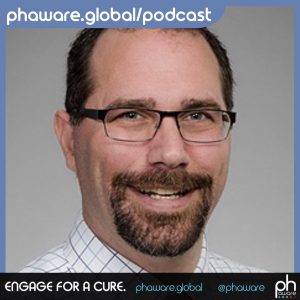Phaware Podcast: Peter Leary, MD, Part 3
Written by |

This podcast series, created and produced by phaware, is being offered as a regular guest feature on Pulmonary Hypertension News to bring the voices and life experiences of PH patients, family members, caregivers, healthcare specialists, and others to our readers. You may listen to the podcast directly, or read it via the transcript that runs below.
I’m Aware That I’m Rare: Peter Leary, MD
The phaware interview: Clinical Trials (Part 3 of 3)
Dr. Peter Leary is a specialist in pulmonary and critical care medicine who cares for patients with pulmonary hypertension. Dr. Leary is focused on clinical care and research for patients with pulmonary vascular disease. In Part 3 of his three-episode series on clinical trials, Dr. Leary discusses the importance of education in clinical research studies in the fight against rare disease.
Hi, I’m Peter Leary. I am a pulmonary hypertension physician in Seattle, Washington. I work for the University of Washington as part of the  University of Washington pulmonary vascular disease program and have been there since about 2009.
University of Washington pulmonary vascular disease program and have been there since about 2009.
In general, I think in pulmonary hypertension, you can never know too much about your disease.
And this is as true for trials as it is for normal clinical practice. It is a rare disease. And so, in clinical practice, we say, you should know as much as you can about your disease because if you go into an ER or you go to see a primary care doctor or you see somebody who’s not involved in PH, you can help make sure that the right decisions are being made.
Now, in the clinical trial, it’s also important to be educated. What does education look like for a clinical trial? What it looks like is … Who’s participating in the trial? What centers are involved in the trial? Is this something that it looks like a lot of pulmonary hypertension centers are getting behind? That normally is pretty reassuring, that the pulmonary vascular community thinks that this is something that’s worth being tried. And if it’s just one or two centers, it may still be a great idea. All big trials start out as small trials.
But you may want to do a little bit more homework, particularly if this is a drug or something that may have some risks to it. And a lot of times, it’s going to be talking to your PH doctor. Sometimes that’s going to be going on to other resources and patient advocacy groups, talking to other people in your community to try and understand what’s there. There’s a lot of votes that come into educating yourself about that.
At the end of the day, the biggest education I think that you need to do is just being a little bit introspective and thinking about yourself. Are you somebody for whom the potential benefit of making an impact on the disease outweighs the fact that you may be getting a sugar pill for six months? And is that a choice that you’re OK with? And if you’re OK with that kind of a choice, then I think a clinical trial can be a great thing.
A lot of participating in clinical trial is one, knowing about the intervention, knowing whether or not the pulmonary vascular disease community supports it, but also thinking about yourself and whether or not that’s a choice that you want to make.
I think there’s a lot of different reasons why people get in clinical trials. Some people get in clinical trials because it is oftentimes the earliest place that you can get a new drug. Some people, particularly if they’re not doing well will get into a clinical trial because they’ll say, “You know what? We don’t know if this works. We don’t know if I’m going to get a sugar pill. But if there’s a chance that I’m going to get this drug and it’s going to help me, I want to do it as soon as I can.” Some people get into a clinical trial for that reason. And that’s a perfectly fine and valid reason, provided someone knows all the parameters going into it.
Some people get into a clinical trial because they say, “The reason why there are drugs for pulmonary hypertension now and the reason why we know as much about pulmonary hypertension now is that somebody before me participated in clinical trials. So I’m going to participate in clinical trials so that we can continue to build that knowledge.”
Other people say, “Hey, I’ve got enough on my plate. I am working on how to cut salt out of my diet and keep my fluids down and get all my medicines in on time. And I don’t have the time to participate in a clinical trial right now.” And that is perfectly OK. That full range is out there and it really is just about knowing yourself and knowing what you can do.
Sometimes, if you don’t want to participate in the trial, participating in observational research, something where you’re not getting an intervention, where the time commitment is often a little bit less, can still be a very meaningful way to impact this disease. Or being part of a support group. All these different avenues can still help keep this community growing and help those around you, and aren’t necessarily a trial.
But for some people, participating in a trial is the way that they do that.
The most impressive thing related to trials for me in this field is that we don’t have to go back very far in pulmonary hypertension to a point where we had no drugs to treat pulmonary hypertension. Now we’ve got over a dozen drugs to treat pulmonary hypertension. That doesn’t happen because there is one researcher or a group of researchers.
It doesn’t happen because there’s one patient or a group of patients, one doctor or group of doctors. You really need the whole pulmonary vascular disease community working together to get that many drugs available to patients in a short period of time. You need patients. You need doctors. You need researchers. Industry has been a part of this as well. Without all of those pieces working together, I think there would be no chance for as many new options to have developed over such a short period of time.
I think we’ve got some challenges ahead of us now in terms of how best to use the tools we’ve already got and how to keep that pace going where we can keep building new tools for PH. I think it’s not any individual trial for me. It’s really looking to see how far we’ve come in a short period of time, but then also taking that step back to say, “Yeah, we’ve come a long way. Good for us. But there’s still a lot more that needs to be done.” And the way that we’re going to be able to do it is continuing to work together — that kind of total pulmonary vascular disease community to get there.
My name is Peter Leary and I am aware that I’m rare.
EVERYBODY HAS A STORY. WHAT’S YOURS?
Phaware global association wants to share your pulmonary hypertension story with their engaged global audience. Whether you are a patient, caregiver, or medical professional, they are enlisting PH community members from around the world. Visit www.phawarepodcast.libsyn.com/contact to share your story and to be considered for a future episode. Never miss an episode with the phaware podcast app. Learn more about pulmonary hypertension at www.phaware.global. #phaware
***
Note: Pulmonary Hypertension News is strictly a news and information website about the disease. It does not provide medical advice, diagnosis, or treatment. This content is not intended to be a substitute for professional medical advice, diagnosis, or treatment. Always seek the advice of your physician or other qualified health provider with any questions you may have regarding a medical condition. Never disregard professional medical advice or delay in seeking it because of something you have read on this website. The opinions expressed in this column are not those of Pulmonary Hypertension News or its parent company, Bionews Services, and are intended to spark discussion about issues pertaining to pulmonary hypertension.






Leave a comment
Fill in the required fields to post. Your email address will not be published.